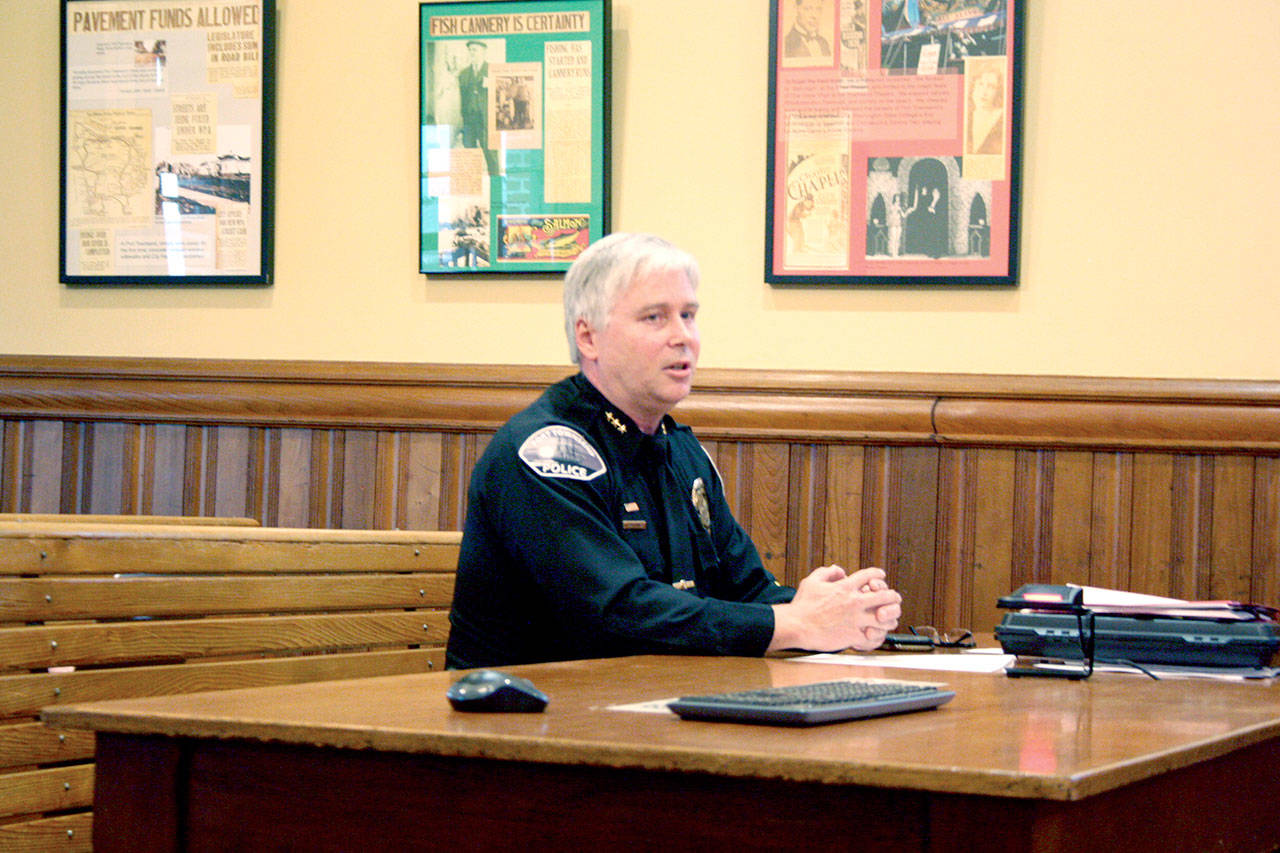PORT TOWNSEND — The Port Townsend Police Department has preliminary approval to upgrade its vehicle-mounted systems to eye-level body cameras.
The City Council unanimously passed the first reading of a resolution Tuesday night that would authorize a five-year contract with Axon Enterprise Inc. for 20 cameras. The council will consider final approval at a second reading of the resolution.
The pen-shaped cameras can be attached to a pair of glasses, a cap or a collar.
The purchase, not to exceed $90,000, would equip all 15 officers and make a few available for reserves or replacement, Port Townsend Police Chief Michael Evans said.
The dash cameras would immediately be decommissioned, he said.
“One of the benefits is the ability for the audio and video unit to travel with the officer,” Evans told the council. “When the camera goes with the officer, the camera sees what the officer sees.”
The city would save about $8,000 during a five-year period and provide access to each member of its police force, according to city documents.
The vehicle-mounted systems are installed in about two vehicles per year, and if an officer gets about 50 yards away from the car, the audio portion of the incident may be lost, Evans said.
The body cameras also come with cloud storage and redaction software that automatically blurs faces to protect private citizens, Evans said.
Each of the body cameras would be upgraded every 2½ years, he said.
Evans showed an Axon video that provided three camera angles of the same incident — from eye level, chest level and from a vehicle-mounted dash camera.
He said the traditional body camera is mounted on the front of an officer’s chest, and the video can be blocked by hands or a weapon if the officer has to use force.
“That’s not the best view, and it certainly doesn’t see what you’re seeing up here,” Evans said, referring to the eye-level mount.
Chest-level cameras can be knocked away in a struggle, he added, but eye-level cameras have a better chance of remaining in place.
“Naturally and through our training, we protect that area [near our head] more,” Evans said. “As soon as the camera gets knocked off, it becomes useless except for the audio portion.”
Council member David Faber asked about traffic stops, and Evans confirmed the devices can start recording and remember the previous 30 or 60 seconds before the button was pressed, depending on device settings.
Faber said that helps to provide better context for both the officer and the potential defendant, if criminal charges are eventually involved.
Evans also confirmed council member Michelle Sandoval’s question about training.
“Yes, they would have to learn how to use this,” Evans said. “But they’re not going from no camera to a body camera.”
The police department starting using its vehicle-mounted system about 2004, he said.
Council member Ariel Speser said she had seen a presentation earlier in the day from Evans and police navigator Jud Haynes that showed how video can be used as an educational tool, particularly in how a situation can be de-escalated.
“The training on their use and the policy is really good,” Evans said.
Most of the video will be deleted after 90 days in the cloud, but some other files and active cases will have different public records retention policies, he said.
Speser and council member Bob Gray said the body cameras are worthwhile.
“For both parties, it’s a net positive,” Faber said.
________
Jefferson County Managing Editor Brian McLean can be reached at 360-385-2335, ext. 6, or at bmclean@peninsuladailynews.com.

